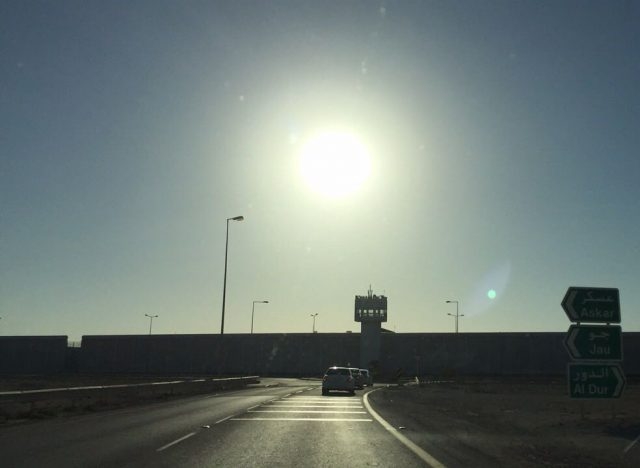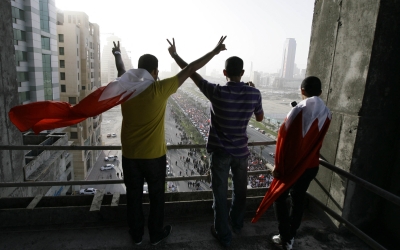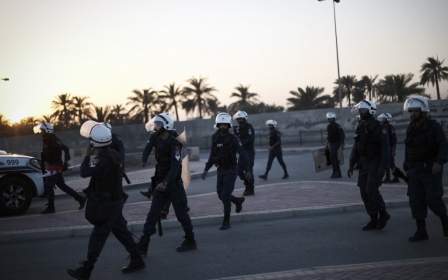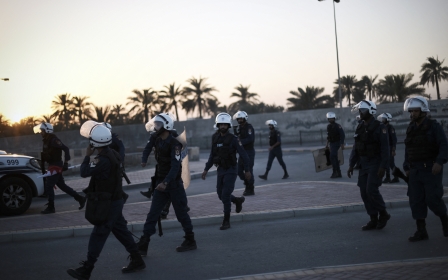Bahrain: Calls to suspend UK assistance over prison brutality

Routine violence and appalling standards of hygiene at Bahrain's infamous Jau prison have prompted a call for action from British cross-party politicians for the UK government to suspend assistance to the Bahraini government.
British MPs tabled a motion on Monday calling on the UK government to "suspend technical assistance" to oversight bodies in Bahrain in response to a brutal crackdown against protesting prisoners on 17 April. The crackdown saw prison officials and police officers beating inmates and subjecting them to "torture and cruel and degrading treatment".
In testimony shared with Middle East Eye, prisoner Sayed Alawi described riot police "competing" to brutalise him as they dragged him out of the cell, "and beat me with their hands and legs all over my body".
'While he was beating me, he was chanting "we’ll step on Shia'''
- Sayed Alawi, prisoner
Sentenced to 14 years in jail, Alawi is currently in Jau prison, a notorious centre on Bahrain's south-east coast that houses many of the country's highest-profile political prisoners.
The situation worsened further for Alawi following concerns over an outbreak of Covid-19 in the prison. From 31 March, he and his 10 cellmates were confined to a 20 square metre cell for 18 days, with no means of communicating with the outside world.
New MEE newsletter: Jerusalem Dispatch
Sign up to get the latest insights and analysis on Israel-Palestine, alongside Turkey Unpacked and other MEE newsletters
While the Bahraini government has only ever confirmed a handful of infections, human rights groups have warned that the numbers are likely far higher, a situation exacerbated by the poor conditions in the jail.
"No sun, no calls, personal hygiene products ran out and we were not allowed to go to the canteen to get more," said Alawi, who added that a number of inmates who suffered from "diseases" were not allowed to leave their cells to get medical attention.
On 17 April, security officials violently broke up a sit-in being held by prisoners protesting against their poor treatment, as well as the death of political prisoner Abbas Mallallah. Police officers responded by firing tear gas and stun grenades into the cells and then beating the inmates.
"They were competing in beating me up," said Alawi. "I remember one of them kicked me with his knees, with all his power in my face. Another one kicked me directly in my private parts, my testicles."
"I was trying to protect my face, I couldn’t. I was hit in my left eye, I couldn’t see. They continued to beat me. I couldn’t take my breath because of some of the kicks in my chest."
He was then taken outside of the prison building and dragged onto a bus, where he was repeatedly beaten by metal rods. By the end, Alawi said, his "blood was all over the bus".
Among those who allegedly attacked them during the crackdown was a Syrian man Alawi identified as Ahmed Farih. He described the prison officer as "vengeful" and openly sectarian, having violently abused many of the inmates for "several years".
"While he was beating me, he was chanting 'we’ll step on Shia'," he said.
Following the incident, 64 inmates from Jau prison were forcibly disappeared for a period of 19 days and held incommunicado for between 30 and 36 days, according to the Bahrain Institute for Rights and Democracy (Bird).
Prisoners have been denied in-person visits with family members since February 2020 and video calls have been sporadic.
“Years of inaction on the part of Bahrain’s western allies has emboldened Bahrain and allowed horrific attacks like that of 17 April to take place with zero accountability," said Sayed Ahmed Alwadaei, director of Bird, speaking to MEE.
"If the UK were serious about reform in Bahrain, they would cease doing PR for the regime, stop throwing money at ineffective oversight bodies and press Bahrain to allow the UN special rapporteur on torture immediate access to Jau prison to investigate the recent attack.”
A 'well-run facility'
In mid-May, Bahraini activists called out the UK ambassador to Bahrain, Roddy Drummond, after he described Jau prison as a "well-run facility" following a visit on 3 May.
In the statement posted on his Twitter account, Drummond added that "vaccinations were offered to all prisoners" and said it had met a good standard of hygiene for tackling Covid-19.
Maryam Alkhawaja, a campaigner whose father is held in Jau prison, tweeted that Drummond was "doing PR for the Bahrain regime".
In Monday's motion, UK MPs condemned statements put out by Bahrain’s Ministry of Interior Ombudsman and the Bahraini National Institute for Human Rights - two bodies that receive British funding - for issuing "false and misleading statements" about the 17 April incident.
The UK government has spent millions in assistance to the Bahraini government in the wake of the 2011 Arab Spring uprisings in the country, ostensibly to help reform the country's criminal justice and oversight system. However, human rights campaigners and the UN have criticised the reforms as "window dressing" and lacking independence.
Alawi said that following his treatment at the prison, he had submitted a complaint to the ombudsman and the Special Investigation Unit, another UK-funded organisation, but had received no response.
British MPs urged the UK government "to suspend technical assistance to Bahraini oversight bodies" as well as calling on them to "oppose the criminalisation and prosecution of the attack’s victims and ensure that they are not subjected to further reprisals".
Concerns have also been raised about the threat to prisoners from Covid-19.
Bird reported that on Saturday a number of Covid-19 cases had been detected in building 12 of Jau prison, which currently houses over 200 political prisoners. The organisation said it was able to verify five cases, but prisoners claimed that over 20 inmates had been infected.
In his testimony, Alawi said he was sceptical of any change in the situation anytime soon - instead putting his faith in the possibility of divine judgement.
"I say nothing but, 'for us God sufficeth, and He is the best disposer of affairs'," he said, quoting a passage from the Quran.
“'And soon will the unjust assailants know what vicissitudes their affairs will take'.”
Middle East Eye delivers independent and unrivalled coverage and analysis of the Middle East, North Africa and beyond. To learn more about republishing this content and the associated fees, please fill out this form. More about MEE can be found here.






